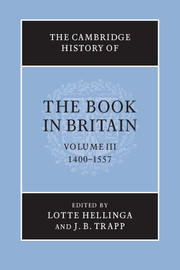Book contents
- Frontmatter
- Introduction
- 1 Literacy, books and readers
- TECHNIQUE AND TRADE
- COLLECTIONS AND OWNERSHIP
- READING AND USE OF BOOKS
- I BOOKS FOR SCHOLARS
- II PROFESSIONS
- III THE LAY READER
- 22 Schools and school-books
- 23 Practical books for the gentleman
- 24 Devotional literature
- 25 Gentlewomen’s reading
- 26 Music
- 27 Literary texts
- 28 Press, politics and religion
- Appendix
- List of abbreviations
- Bibliography
- Photo credits
- General index
- Index of manuscripts
- Bibliographic index of printed books
- Plate Section"
- References
22 - Schools and school-books
from III - THE LAY READER
Published online by Cambridge University Press: 28 March 2008
- Frontmatter
- Introduction
- 1 Literacy, books and readers
- TECHNIQUE AND TRADE
- COLLECTIONS AND OWNERSHIP
- READING AND USE OF BOOKS
- I BOOKS FOR SCHOLARS
- II PROFESSIONS
- III THE LAY READER
- 22 Schools and school-books
- 23 Practical books for the gentleman
- 24 Devotional literature
- 25 Gentlewomen’s reading
- 26 Music
- 27 Literary texts
- 28 Press, politics and religion
- Appendix
- List of abbreviations
- Bibliography
- Photo credits
- General index
- Index of manuscripts
- Bibliographic index of printed books
- Plate Section"
- References
Summary
Between the introduction of literacy to England in 597 and the beginning of the fifteenth century, 800 years elapsed. During this period, a rich variety of schools grew up all over the kingdom. Religious houses were the earliest centres of education, and in 1400 there were still many schools in monasteries, friaries, cathedrals, collegiate churches and nunneries. Some were for adult novices, and others for children who lived in the communities as altar-boys, choristers, or wealthy pupils being brought up by an abbot or abbess. By the time of King Alfred, schooling had spread to the royal household, and in 1400 training was still provided there for noble wards and boy choristers, as it was in the great noble households which modelled themselves on the King’s. In the tenth century, Church legislators had urged the parish clergy to teach boys and, while this task was never universally observed, some clergy gave instruction to single pupils or small groups in the fifteenth century, to enhance their income or provide themselves with assistants. From a very early date, too, there must have been informal teaching by one literate person of another: parent to child, merchant to apprentice, senior clerk to junior learner.
Schools open to the public may also have originated in Saxon times and certainly existed by the late eleventh century. They were particularly to be found in towns, where a master could gather enough pupils to live off their fees, and from boarding them too if they came from a distance. At Þrst such schools were often personal ventures and easily came to grief, but by 1400 they had frequently gained stability through the emergence of a local patron (bishop, monastery or lord of the manor) who appointed new masters when necessary. They often acquired their own buildings, books and scholarships Ð resources which also promoted continuity.
Keywords
- Type
- Chapter
- Information
- The Cambridge History of the Book in Britain , pp. 449 - 469Publisher: Cambridge University PressPrint publication year: 1999
References
- 3
- Cited by

